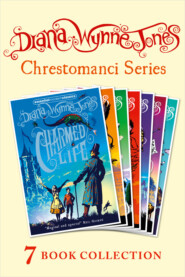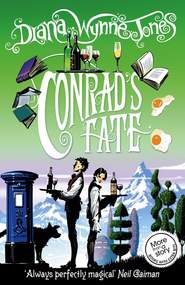По всем вопросам обращайтесь на: info@litportal.ru
(©) 2003-2024.
✖
The Magicians of Caprona
Настройки чтения
Размер шрифта
Высота строк
Поля
The Magicians of Caprona
Diana Wynne Jones
Glorious new rejacket of a Diana Wynne Jones favourite, featuring Chrestomanci – now a book with extra bits!The Dukedom of Caprona is a place where music is enchantment and spells are as slippery as spaghetti. The magical business is run by two families - the Montanas and the Petrocchis - and they are deadly rivals. So when all the spells start going wrong, they naturally blame each other.Chrestomanci suspects an evil enchanter; others say it is a White Devil. Or maybe a different kind of magic is needed to save Caprona…
Illustrated by Tim Stevens
DEDICATION (#ulink_4d91aee6-bd20-5c9e-8593-ac672e5219a6)
For John
CONTENTS
Cover (#u4d78c723-3375-570a-86c7-959939354eb4)
Title Page (#ud4111707-3282-579e-b7a2-a94944dd4ec3)
Dedication (#u1202d2b1-742f-536c-9bd2-56768e94316f)
Chapter One
Chapter Two
Chapter Three
Chapter Four
Chapter Five
Chapter Six
Chapter Seven
Chapter Eight
Chapter Nine
Chapter Ten
Chapter Eleven
Chapter Twelve
Chapter Thirteen
Chapter Fourteen
Chapter Fifteen
Author’s Note
Other Works
Copyright
About the Publisher
CHAPTER ONE (#u8bb0f7ee-043a-575e-b2b1-f412da8ddde9)
Spells are the hardest thing in the world to get right. This was one of the first things the Montana children learnt. Anyone can hang up a charm, but when it comes to making that charm, whether it is written or spoken or sung, everything has to be just right, or the most impossible things happen.
An example of this is young Angelica Petrocchi, who turned her father bright green by singing a wrong note. It was the talk of all Caprona – indeed of all Italy – for weeks.
The best spells still come from Caprona, in spite of the recent troubles, from the Casa Montana or the Casa Petrocchi. If you are using words that really work, to improve reception on your radio or to grow tomatoes, then the chances are that someone in your family has been on a holiday to Caprona and brought the spell back. The Old Bridge in Caprona is lined with little stone booths, where long coloured envelopes, scrips and scrolls hang from strings like bunting.
You can get spells there from every spell-house in Italy. Each spell is labelled as to its use and stamped with the sign of the house which made it. If you want to find out who made your spell, look among your family papers. If you find a long cherry-coloured scrip stamped with a black leopard, then it came from the Casa Petrocchi. If you find a leaf-green envelope bearing a winged horse, then the House of Montana made it. The spells of both houses are so good that ignorant people think that even the envelopes can work magic. This, of course, is nonsense. For, as Paolo and Tonino Montana were told over and over again, a spell is the right words delivered in the right way.
The great houses of Petrocchi and Montana go back to the first founding of the State of Caprona, seven hundred years or more ago. And they are bitter rivals. They are not even on speaking terms. If a Petrocchi and a Montana meet in one of Caprona’s narrow golden-stone streets, they turn their eyes aside and edge past as if they were both walking past a pig-sty. Their children are sent to different schools and warned never, ever to exchange a word with a child from the other house.
Sometimes, however, parties of young men and women of the Montanas and the Petrocchis happen to meet when they are strolling on the wide street called the Corso in the evenings. When that happens, other citizens take shelter at once. If they fight with fists and stones, that is bad enough, but if they fight with spells, it can be appalling.
An example of this is when the dashing Rinaldo Montana caused the sky to rain cowpats on the Corso for three days. It created great distress among the tourists.
“A Petrocchi insulted me,” Rinaldo explained, with his most flashing smile. “And I happened to have a new spell in my pocket.”
The Petrocchis unkindly claimed that Rinaldo had misquoted his spell in the heat of the battle. Everyone knew that all Rinaldo’s spells were love-charms.
The grown-ups of both houses never explained to the children just what had made the Montanas and the Petrocchis hate one another so. That was a task traditionally left to the older brothers, sisters and cousins. Paolo and Tonino were told the story repeatedly, by their sisters Rosa, Corinna and Lucia, by their cousins Luigi, Carlo, Domenico and Anna, and again by their second-cousins Piero, Luca, Giovanni, Paula, Teresa, Bella, Angelo and Francesco. They told it themselves to six smaller cousins as they grew up. The Montanas were a large family.
Two hundred years ago, the story went, old Ricardo Petrocchi took it into his head that the Duke of Caprona was ordering more spells from the Montanas than from the Petrocchis, and he wrote old Francesco Montana a very insulting letter about it. Old Francesco was so angry that he promptly invited all the Petrocchis to a feast. He had, he said, a new dish he wanted them to try. Then he rolled Ricardo Petrocchi’s letter up into long spills and cast one of his strongest spells over it. And it turned into spaghetti. The Petrocchis ate it greedily and were all taken ill, particularly old Ricardo – for nothing disagrees with a person so much as having to eat his own words. He never forgave Francesco Montana, and the two families had been enemies ever since.
“And that,” said Lucia, who told the story oftenest, being only a year older than Paolo, “was the origin of spaghetti.”
It was Lucia who whispered to them all the terrible heathen customs the Petrocchis had: how they never went to Mass or confessed; how they never had baths or changed their clothes; how none of them ever got married but just – in an even lower whisper – had babies like kittens; how they were apt to drown their unwanted babies, again like kittens, and had even been known to eat unwanted uncles and aunts; and how they were so dirty that you could smell the Casa Petrocchi and hear the flies buzzing right down the Via Sant’ Angelo.
There were many other things besides, some of them far worse than these, for Lucia had a vivid imagination. Paolo and Tonino believed every one, and they hated the Petrocchis heartily, though it was years before either of them set eyes on a Petrocchi. When they were both quite small, they did sneak off one morning, down the Via Sant’ Angelo almost as far as the New Bridge, to look at the Casa Petrocchi. But there was no smell and no flies buzzing to guide them, and their sister Rosa found them before they found it. Rosa, who was eight years older than Paolo and quite grown-up even then, laughed when they explained their difficulty, and good-naturedly took them to the Casa Petrocchi. It was in the Via Cantello, not the Via Sant’ Angelo at all.
Paolo and Tonino were most disappointed in it. It was just like the Casa Montana. It was large, like the Casa Montana, and built of the same golden stone of Caprona, and probably just as old. The great front gate was old knotty wood, just like their own, and there was even the same golden figure of the Angel on the wall above the gate. Rosa told them that both Angels were in memory of the Angel who had come to the first Duke of Caprona bringing a scroll of music from Heaven – but the boys knew that. When Paolo pointed out that the Casa Petrocchi did not seem to smell much, Rosa bit her lip and said gravely that there were not many windows in the outside walls, and they were all shut.
“I expect everything happens round the yard inside, just like it does in our Casa,” she said. “Probably all the smelling goes on in there.”
They agreed that it probably did, and wanted to wait to see a Petrocchi come out. But Rosa said she thought that would be most unwise, and pulled them away. The boys looked over their shoulders as she dragged them off and saw that the Casa Petrocchi had four golden-stone towers, one at each corner, where the Casa Montana only had one, over the gate.
“It’s because the Petrocchis are show-offs,” Rosa said, dragging. “Come on.”
Since the towers were each roofed with a little hat of red pantiles, just like their own roofs or the roofs of all the houses in Caprona, Paolo and Tonino did not think they were particularly grand, but they did not like to argue with Rosa. Feeling very let down, they let her drag them back to the Casa Montana and pull them through their own large knotty gate into the bustling yard beyond. There Rosa left them and ran up the steps to the gallery, shouting, “Lucia! Lucia, where are you? I want to talk to you!”
Doors and windows opened into the yard all round, and the gallery, with its wooden railings and pantiled roof, ran round three sides of the yard and led to the rooms on the top floor. Uncles, aunts, cousins large and small, and cats were busy everywhere, laughing, cooking, discussing spells, washing, sunning themselves or playing. Paolo gave a sigh of contentment and picked up the nearest cat.
“I don’t think the Casa Petrocchi can be anything like this inside.”
Diana Wynne Jones
Glorious new rejacket of a Diana Wynne Jones favourite, featuring Chrestomanci – now a book with extra bits!The Dukedom of Caprona is a place where music is enchantment and spells are as slippery as spaghetti. The magical business is run by two families - the Montanas and the Petrocchis - and they are deadly rivals. So when all the spells start going wrong, they naturally blame each other.Chrestomanci suspects an evil enchanter; others say it is a White Devil. Or maybe a different kind of magic is needed to save Caprona…
Illustrated by Tim Stevens
DEDICATION (#ulink_4d91aee6-bd20-5c9e-8593-ac672e5219a6)
For John
CONTENTS
Cover (#u4d78c723-3375-570a-86c7-959939354eb4)
Title Page (#ud4111707-3282-579e-b7a2-a94944dd4ec3)
Dedication (#u1202d2b1-742f-536c-9bd2-56768e94316f)
Chapter One
Chapter Two
Chapter Three
Chapter Four
Chapter Five
Chapter Six
Chapter Seven
Chapter Eight
Chapter Nine
Chapter Ten
Chapter Eleven
Chapter Twelve
Chapter Thirteen
Chapter Fourteen
Chapter Fifteen
Author’s Note
Other Works
Copyright
About the Publisher
CHAPTER ONE (#u8bb0f7ee-043a-575e-b2b1-f412da8ddde9)
Spells are the hardest thing in the world to get right. This was one of the first things the Montana children learnt. Anyone can hang up a charm, but when it comes to making that charm, whether it is written or spoken or sung, everything has to be just right, or the most impossible things happen.
An example of this is young Angelica Petrocchi, who turned her father bright green by singing a wrong note. It was the talk of all Caprona – indeed of all Italy – for weeks.
The best spells still come from Caprona, in spite of the recent troubles, from the Casa Montana or the Casa Petrocchi. If you are using words that really work, to improve reception on your radio or to grow tomatoes, then the chances are that someone in your family has been on a holiday to Caprona and brought the spell back. The Old Bridge in Caprona is lined with little stone booths, where long coloured envelopes, scrips and scrolls hang from strings like bunting.
You can get spells there from every spell-house in Italy. Each spell is labelled as to its use and stamped with the sign of the house which made it. If you want to find out who made your spell, look among your family papers. If you find a long cherry-coloured scrip stamped with a black leopard, then it came from the Casa Petrocchi. If you find a leaf-green envelope bearing a winged horse, then the House of Montana made it. The spells of both houses are so good that ignorant people think that even the envelopes can work magic. This, of course, is nonsense. For, as Paolo and Tonino Montana were told over and over again, a spell is the right words delivered in the right way.
The great houses of Petrocchi and Montana go back to the first founding of the State of Caprona, seven hundred years or more ago. And they are bitter rivals. They are not even on speaking terms. If a Petrocchi and a Montana meet in one of Caprona’s narrow golden-stone streets, they turn their eyes aside and edge past as if they were both walking past a pig-sty. Their children are sent to different schools and warned never, ever to exchange a word with a child from the other house.
Sometimes, however, parties of young men and women of the Montanas and the Petrocchis happen to meet when they are strolling on the wide street called the Corso in the evenings. When that happens, other citizens take shelter at once. If they fight with fists and stones, that is bad enough, but if they fight with spells, it can be appalling.
An example of this is when the dashing Rinaldo Montana caused the sky to rain cowpats on the Corso for three days. It created great distress among the tourists.
“A Petrocchi insulted me,” Rinaldo explained, with his most flashing smile. “And I happened to have a new spell in my pocket.”
The Petrocchis unkindly claimed that Rinaldo had misquoted his spell in the heat of the battle. Everyone knew that all Rinaldo’s spells were love-charms.
The grown-ups of both houses never explained to the children just what had made the Montanas and the Petrocchis hate one another so. That was a task traditionally left to the older brothers, sisters and cousins. Paolo and Tonino were told the story repeatedly, by their sisters Rosa, Corinna and Lucia, by their cousins Luigi, Carlo, Domenico and Anna, and again by their second-cousins Piero, Luca, Giovanni, Paula, Teresa, Bella, Angelo and Francesco. They told it themselves to six smaller cousins as they grew up. The Montanas were a large family.
Two hundred years ago, the story went, old Ricardo Petrocchi took it into his head that the Duke of Caprona was ordering more spells from the Montanas than from the Petrocchis, and he wrote old Francesco Montana a very insulting letter about it. Old Francesco was so angry that he promptly invited all the Petrocchis to a feast. He had, he said, a new dish he wanted them to try. Then he rolled Ricardo Petrocchi’s letter up into long spills and cast one of his strongest spells over it. And it turned into spaghetti. The Petrocchis ate it greedily and were all taken ill, particularly old Ricardo – for nothing disagrees with a person so much as having to eat his own words. He never forgave Francesco Montana, and the two families had been enemies ever since.
“And that,” said Lucia, who told the story oftenest, being only a year older than Paolo, “was the origin of spaghetti.”
It was Lucia who whispered to them all the terrible heathen customs the Petrocchis had: how they never went to Mass or confessed; how they never had baths or changed their clothes; how none of them ever got married but just – in an even lower whisper – had babies like kittens; how they were apt to drown their unwanted babies, again like kittens, and had even been known to eat unwanted uncles and aunts; and how they were so dirty that you could smell the Casa Petrocchi and hear the flies buzzing right down the Via Sant’ Angelo.
There were many other things besides, some of them far worse than these, for Lucia had a vivid imagination. Paolo and Tonino believed every one, and they hated the Petrocchis heartily, though it was years before either of them set eyes on a Petrocchi. When they were both quite small, they did sneak off one morning, down the Via Sant’ Angelo almost as far as the New Bridge, to look at the Casa Petrocchi. But there was no smell and no flies buzzing to guide them, and their sister Rosa found them before they found it. Rosa, who was eight years older than Paolo and quite grown-up even then, laughed when they explained their difficulty, and good-naturedly took them to the Casa Petrocchi. It was in the Via Cantello, not the Via Sant’ Angelo at all.
Paolo and Tonino were most disappointed in it. It was just like the Casa Montana. It was large, like the Casa Montana, and built of the same golden stone of Caprona, and probably just as old. The great front gate was old knotty wood, just like their own, and there was even the same golden figure of the Angel on the wall above the gate. Rosa told them that both Angels were in memory of the Angel who had come to the first Duke of Caprona bringing a scroll of music from Heaven – but the boys knew that. When Paolo pointed out that the Casa Petrocchi did not seem to smell much, Rosa bit her lip and said gravely that there were not many windows in the outside walls, and they were all shut.
“I expect everything happens round the yard inside, just like it does in our Casa,” she said. “Probably all the smelling goes on in there.”
They agreed that it probably did, and wanted to wait to see a Petrocchi come out. But Rosa said she thought that would be most unwise, and pulled them away. The boys looked over their shoulders as she dragged them off and saw that the Casa Petrocchi had four golden-stone towers, one at each corner, where the Casa Montana only had one, over the gate.
“It’s because the Petrocchis are show-offs,” Rosa said, dragging. “Come on.”
Since the towers were each roofed with a little hat of red pantiles, just like their own roofs or the roofs of all the houses in Caprona, Paolo and Tonino did not think they were particularly grand, but they did not like to argue with Rosa. Feeling very let down, they let her drag them back to the Casa Montana and pull them through their own large knotty gate into the bustling yard beyond. There Rosa left them and ran up the steps to the gallery, shouting, “Lucia! Lucia, where are you? I want to talk to you!”
Doors and windows opened into the yard all round, and the gallery, with its wooden railings and pantiled roof, ran round three sides of the yard and led to the rooms on the top floor. Uncles, aunts, cousins large and small, and cats were busy everywhere, laughing, cooking, discussing spells, washing, sunning themselves or playing. Paolo gave a sigh of contentment and picked up the nearest cat.
“I don’t think the Casa Petrocchi can be anything like this inside.”











